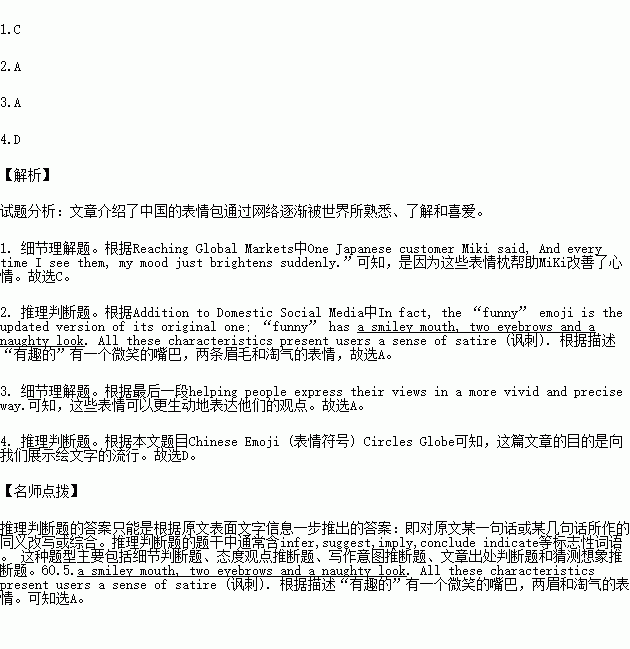题目内容
Chinese Emoji (表情符号) Circles Globe
“Funny”, a made-in-China emoji, seems to have recently moved beyond China. Now, it is more than an emoji, but a cultural expansion.
Reaching Global Markets
A series of “funny” emoji-based bolsters (抱枕) have attracted the attention of Japanese customers. Even if one bolster is more than three times as expensive as in China, it doesn’t kill their desires to buy it. One Japanese customer Miki said, “They are just so cute and I bought three bolsters at one time for my family. And every time I see them, my mood just brightens suddenly.”
A Japanese netizen Kiro Kara said, “I think the emoji implies very complicated meanings. My dad will send it when he doesn’t agree with someone but he has to say something and behave politely.”
Addition to Domestic Social Media
Compared with Japanese impressions of the “funny” emoji, Chinese netizens prefer to use the emoji to tease one another on social media.
One commonly seen online comment is, “We strongly suggest stopping the usage of the emoji. Because every time other people send me the emoji, I feel very uncomfortable and consider myself as a fool.”
Regarded as the most popular emoji, the “funny” emoji has received much attention since its release in 2013. In fact, the “funny” emoji is the updated version of its original one; “funny” has a smiley mouth, two eyebrows and a naughty look. All these characteristics present users a sense of satire (讽刺).
In Everyday Use Abroad
It’s not the first time the Chinese emoji takes the world stage. Earlier this year, one emoji from the Chinese basketball celebrity Yao Ming has been spread through the Middle East region. In a city in southern Egypt, Yao’s smiling emoji has appeared frequently in local traffic signs to remind people the road ahead is one-way. Many locals do not know Yao Ming but are familiar with his emoji and nickname “Chinese Funny Face”.
As a new online language, emojis have become a necessary part of people’s daily life, helping people express their views in a more vivid and precise way. Also, it can help foreigners learn about Chinese culture. But how to properly use “the fifth innovation in China” without hurting others and turn them into commercial advantages still need answers.
1.Why do the bolsters attract Miki’s attention?
A. They are inexpensive.
B. They help reach an agreement.
C. They help brighten the mood.
D. They are helpful to express desire.
2.According to the passage, which of the following is the latest “funny” emoji?

3.Emojis are so popular worldwide mainly because people use them to ______.
A. express their views more vividly
B. present their sense of satire directly
C. imply very complicated meanings properly
D. tease one another on social media purposely
4.The main purpose of the text is to ______.
A. promote the emoji worldwide
B. teach us how to use the emoji
C. explain the meaning the emoji
D. show us the popularity of the emoji


